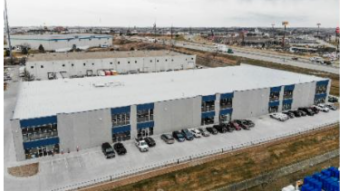By Michael McKiernan
Managing Director – Avison Young
The Chicago industrial market is desperately in search of equilibrium and consistency. Without it, many in the industry question when a significant and sustainable recovery will occur.
The market continues to struggle with volatility in absorption, moving from negative to positive from quarter to quarter; flat rental rates; aggressive concessions; and a slightly improving appetite for investment property. These factors, when viewed in light of the overall economic and business climate, point to a slow and sometimes choppy road for the foreseeable future, perhaps until 2014.
A sustainable recovery in our eyes equates to market characteristics that were prevalent between 2004 and 2005:
- quarterly absorption of 4 to 5 million square feet
- quarterly leasing activity totaling 7 to 9 million square feet
- quarterly sale activity totaling 5 to 6 million square feet
- little if any tenant improvement money
- speculative construction in high profile markets
In these times, it is more important than ever to look beyond the market to the individual participants –
the tenant with a lease expiration or the company needing to take money out of its real estate assets. The fact remains there are businesses out there with legitimate requirements that need to develop a real estate strategy and apply it to their business plans.
Real estate professionals who want to position themselves and their clients for success as we move out of this downturn should focus on the following strategies. In part, they need to answer the question: Where do you want to be when the recovery is in full swing?
Changing the Broker Mindset
The key to prosperity in today’s market, and moving forward, is to rethink the traditional, transaction-based “broker mentality.” Today’s tenants, owners and investors want much more than someone to handle their lease transactions. They’re looking for a strategic partner who can help them restructure their debt, lower occupancy costs, improve efficiencies and find the latest sources for green energy. It’s not just about the real estate. It’s about operations, return on investment, P and L and providing your client a competitive advantage.
Real estate professionals should approach this new way of business from a proactive and creative stance. Seek out and suggest cost saving options for the clients. Initiate discussions with state and municipal leaders about tax abatement or green energy tax credits.
Get Creative with Build to Suit Opportunities
There also are opportunities for build to suit transactions in select infill neighborhoods around the Chicago area. As many companies struggle with increasing transportation costs, some are finding an infill site can be more desirable than paying for trucks to idle in traffic all the way from Bolingbrook to Chicago.
Maximizing the Buy Low, Sell High Approach
The old axiom of “buy low, sell high” can be applied in creative ways in today’s market. While one might think that selling a building now is a losing proposition, there are opportunities for savvy investors to capitalize on the buying side.
Owners who have a well positioned building with strong, long term leases in place can command a fair price, even in a down market. By cashing out, they can funnel that money into new properties and take advantage of discounted pricing. These types of deals work best when selling a well located building with strong fundamentals.
Understanding Today’s Business Climate
Many business owners are taking a step back and reevaluating their financial goals before committing to a plant expansion, lease renewal or new headquarters facility. With slow economic growth and a lack of real consumer spending, owners are reluctant to commit to long term investments. An owner might be hesitant to commit to a $30 million to $40 million real estate project, for example, when there is uncertainty over the return on investment. By understanding an owner’s mindset and operational challenges, a real estate professional can help find creative solutions that fit that client’s needs.
There are many challenges in today’s market. Real estate professionals need to play a different role and bring a wider range of services to the table, moving beyond the “just get the deal done mentality.” By becoming the trusted advisor on restructuring debt and adding green energy strategies, you can bring real value to your clients as they navigate a very different business climate.
Michael McKiernan is a principal and the managing director of Avison Young, Canada’s largest independently-owned commercial real estate services company. He is responsible for the overall operation and direction of the Chicago office, overseeing the efforts of office, industrial, retail and investment teams.



